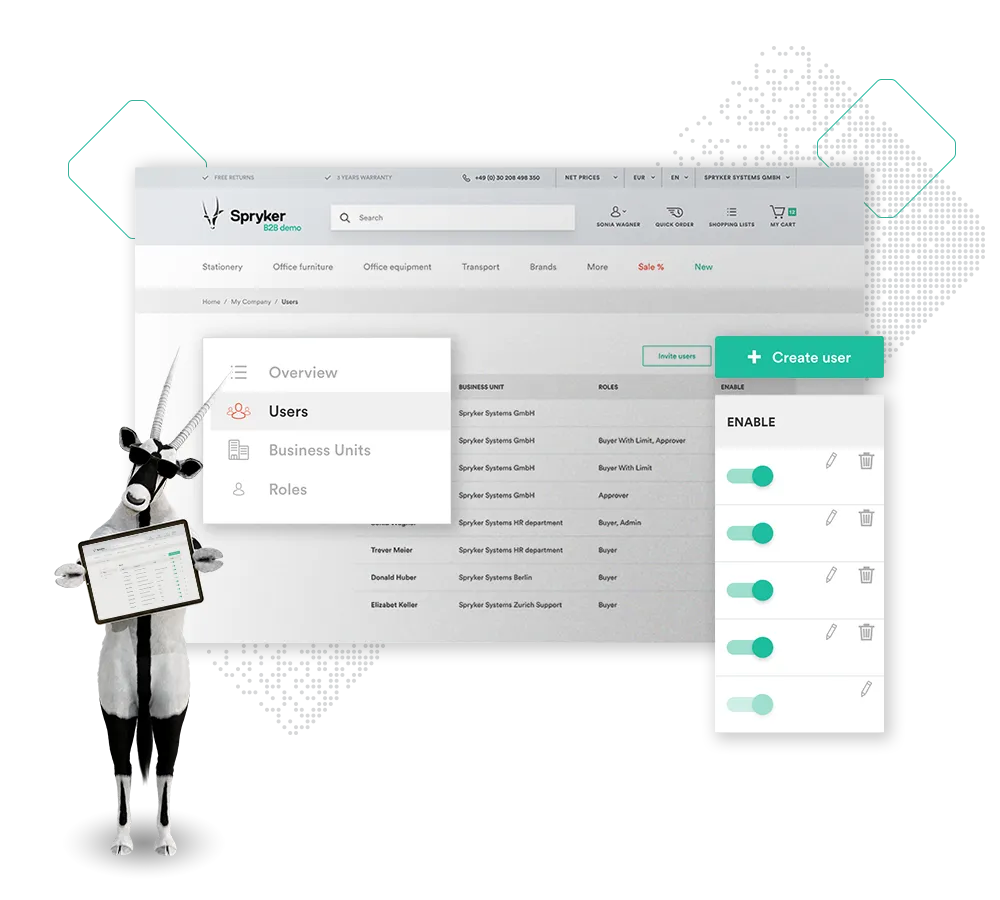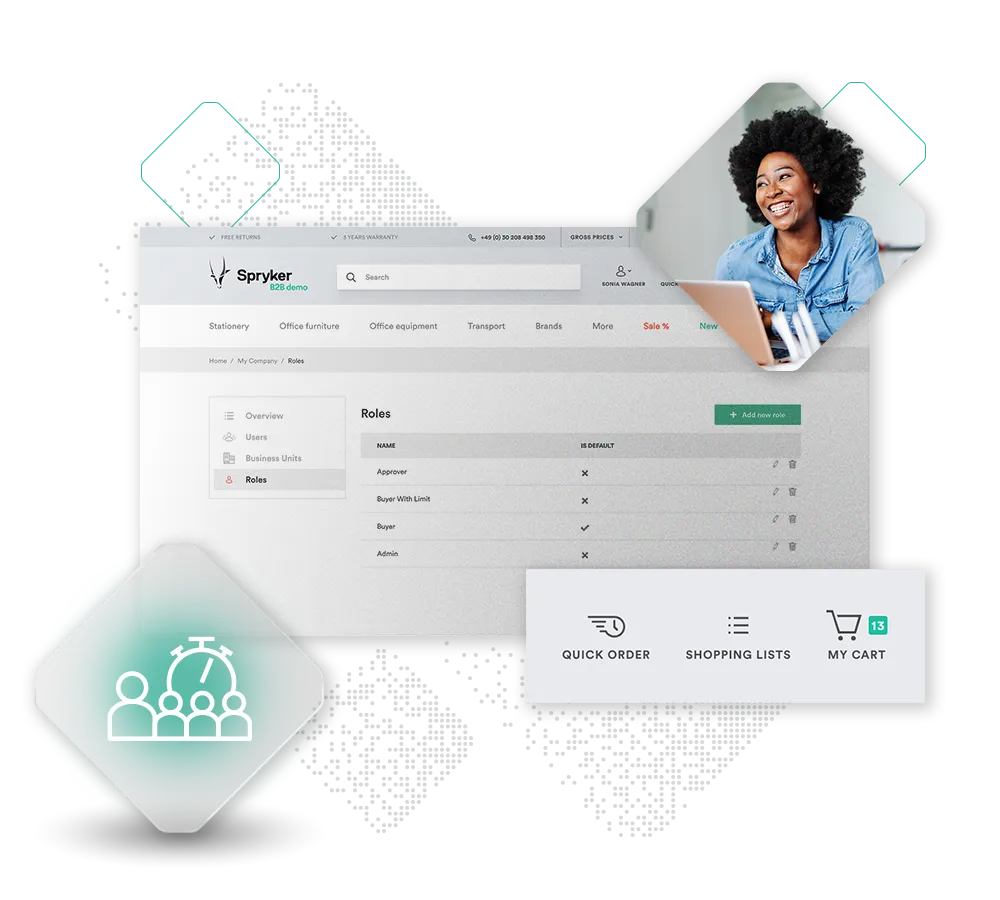How Businesses Can Utilize Digital Self-Service To Improve Customer Experience
Solve the issue of fragmented buyer experience with a B2B customer portal that enables a smooth after-sale process. Consolidate data and manage the relationship while offering insights and autonomy to increase customer stickiness.Status Quo
Convenience is one of the most important elements of contemporary purchasing journeys, even in B2B.
Currently, many businesses offer customers information about their orders and relationship, but from multiple and disparate sources – such as the ERP, CRM, or a Customer Service tool.
This is like handing customers a deck of unshuffled playing cards and asking them to find the ace of spades; they'll find it eventually, but it will be inconvenient and slow.
A lack of digital self-service leads to an inconvenient and fragmented user experience for the customer, and an increase in manual and costly interactions between sales and customer relationship managers.
Customers lack transparency and autonomy as they cannot easily find information about order history, related products, or new offers. They must rely on slow manual interaction to provide the information they want.
Challenges for B2B Businesses Without Digital Self-Service
- Without a portal consolidating all information, customers only have access to limited information about historic orders and interactions.
- Personalization and tailored offers are difficult to offer without consolidated customer data, leading to missed sales opportunities.
- Customer relationship management involves a great deal of manual interaction and processes as customers must reach out to a human to get the data they’re looking for.
This maintenance by sales and service reps is both costly and time-consuming. - Lack of convenience for the customer, which may lead them to look to competitors with better after-sales user experiences.

What is Digital Self-Service?
Digital Self-Service is a customer portal that supports the full customer lifecycle by providing complete visibility into all elements of the business relationship. It manages the after-sales process by consolidating all information and services related to the customer. A Digital Self-Service portal includes information on:
- Order history
- Product updates
- Service data
- The knowledge center
- Company and product news
- Customer-specific assortments
- Subscriptions
- Recommendations
- Troubleshooting
By merging the customer, transaction, and product data into one unified portal, Digital Self-Service puts buyers into the driving seat. Insights, customer service, and after-sales services such as maintenance and repairs are available at the click of a button.
From the sales side, customer portals can be leveraged by sales and service reps by personalizing offers based on previous order histories.
By giving customers autonomy and visibility, B2B businesses can offer a more convenient and cost-effective user experience that will in turn positively impact retention and revenue.
Increase Customer Satisfaction & Stickiness
- Acts as an easy-to-use central point of contact
- Possibility of personalized experiences
- Tailored products and services
- 24/7 availability, with access to information at any time
- Increased customer value through after-sales services
- Support through the entire customer


Efficiency on Buying & Selling Sides
- Acts as a convenient ‘one-stop shop’ for information
- Customers gain full control with self-service
- Tailored and individualized experiences and dashboards increase quality of customer experience
- Order templates and automatic replenishment save time and money
- Customer insights help to inform future offers
Our B2B Solution with Spryker Cloud Commerce OS includes a range of features to enable a Digital Self-Service portal, such as Invoice Management and personalized Offers.
Alongside this core capability, we work with an extensive network of partners who can further extend your business self-service capabilities with features such as a dedicated Customer Service Tool.
Supporting you every step of the journey, our in-house business consultants offer tailored enabling services, such as Digitization Mapping, to ensure your transformation to Digital Self-Service is successful.
Spryker Capabilities
- My Account functionality
- Configurable bundles
- Customer-specific pricing
- Product Links
- Account-specific assortment
- Return Management
- Invoice generation
- Approval processes
- Shopping List/Order Templates
- User Management
Enabling Services
- Calibration session
- Customer journey analysis
- Digitization mapping
- Operating model coaching
- Process design workshop
Technology Partners
- Tealium
- Fareye
- Vertex
- Adyen
- Balance
Läpple
Läpple is a global provider of pressed parts, body shell components, standardized parts, rotatory tables and automation tools. They have 2700 employees and a 500M€ turnover.
Customer challenge:
Läpple wanted to maximize their online shop revenue while delivering high-performance and customized options. There were millions of products, with up to 600 variants, many continuously in stock and available at short notice.
Solution:
Fibro (one of Läpple's brands) went live in just 4 months, including a Self-Service portal with a consolidated view on the commercial relationship. This empowered the buyers with several convenient functionalities.
Outcomes:
- Higher customer satisfaction
- More efficient workflows
- Streamlined operations
- More and better quality data from customers
About Spryker
Spryker is the leading global composable commerce platform for enterprises with sophisticated business models to enable growth, innovation, and differentiation. Designed specifically for sophisticated transactional businesses, Spryker’s easy-to-use, headless, API-first model offers a best-of-breed approach that provides businesses the flexibility to adapt, scale, and quickly go to market while facilitating faster time-to-value throughout their digital transformation journey. As a global platform leader for B2B and B2C Enterprise Marketplaces, IoT Commerce, and Unified Commerce, Spryker has empowered 150+ global enterprise customers worldwide and is trusted by brands such as ALDI, Siemens, ZF Friedrichshafen, and Ricoh. Spryker is a privately held technology company headquartered in Berlin and New York backed by world class investors such as TCV, One Peak, Project A, Cherry Ventures, and Maverick Capital. Learn more at spryker.com.

